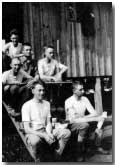Timeline - 1917
 The First World War spanned four years and involved many nation states.
The First World War spanned four years and involved many nation states.
This section lists the events of the year 1917, the fourth year of the war. This year saw the adoption by the German high command of the disastrous policy of unrestricted submarine warfare - disastrous in that it brought about America's entry into the war within the space of a couple of months, and ultimately led to her downfall the following year.
Meanwhile the British launched a major offensive at Passchendaele in autumn 1917: as at the Somme the previous year it proved a highly costly failure. 1917 also saw Russia's exit from the war amid two revolutions, the first in February and a second in October.
For a day by day account click any given month using the sidebar to the right.
| Date | Event |
|---|---|
 January 10 January 10 |
Allies state peace objectives in response to US President Woodrow Wilson's December 1916 peace note |
 January 31 January 31 |
Germany announces unrestricted submarine warfare |
 February 1 February 1 |
Germany resumes unrestricted submarine warfare |
 February 3 February 3 |
US severs diplomatic ties with Germany |
 February 23 - April 5 February 23 - April 5 |
German forces begin withdrawal to strong positions on the Hindenburg Line |
 February 24 February 24 |
Zimmermann Telegram is passed to the US by Britain, detailing alleged German proposal of an alliance with Mexico against the US |
 February 26 February 26 |
US President Woodrow Wilson requests permission from Congress to arm US merchantmen |
 March 1 March 1 |
Zimmermann Telegram published in US press |
 March 11 March 11 |
British capture Baghdad |
 March 12 March 12 |
US President Woodrow Wilson announces arming of US merchantmen by executive order after failing to win approval from Congress |
 March 15 March 15 |
Tsar Nicholas II abdicates as a consequence of Russian Revolution |
 March 20 March 20 |
US President Woodrow Wilson's war cabinet votes unanimously in favour of declaring war on Germany |
 April 2 April 2 |
US President Woodrow Wilson delivers war address to Congress |
 April 6 April 6 |
US declares war on Germany |
 April 9-20 April 9-20 |
Nivelle Offensive (Second Battle of Aisne, Third Battle of Champagne) ends in French failure |
 April 9 April 9 |
Canadian success at the Battle of Vimy Ridge |
 April 16 April 16 |
Lenin arrives in Russia |
 April 29 - May 20 April 29 - May 20 |
Mutiny breaks out among French army |
 May 12 - October 24 May 12 - October 24 |
10th, 11th and 12th Battles of Isonzo fought, ending in Italian failure |
 May 28 May 28 |
Pershing leaves New York for France |
 June 7 June 7 |
British explode 19 large mines under the Messines Ridge |
 June 15 June 15 |
US Espionage Act passed |
 June 26 June 26 |
First US troops arrive in France, 1st Division |
 June 27 June 27 |
Greece enters the war on the side of the Allies |
 July 2 July 2 |
Pershing makes first request for army of 1,000,000 men |
 July 6 July 6 |
T.E. Lawrence and the Arabs capture Aquaba |
 July 11 July 11 |
Pershing revises army request figures upwards to 3,000,000 |
 July 16 July 16 |
Third Battles of Ypres (Passchendaele) begins |
 July 31 July 31 |
Major British offensive launched at Ypres. |
 September 1 September 1 |
Germany takes the northernmost end of the Russian front in the Riga offensive |
 October 24 October 24 |
Austria-Germany breakthrough at Caporetto on Italian front |
 November 7 November 7 |
Bolshevik Revolution in Russia results in Communist government under Lenin taking office |
 November 20 November 20 |
British launch surprise tank attack at Cambrai |
 December 7 December 7 |
US declares war on Austria-Hungary |
 December 9 December 9 |
Jerusalem falls to Britain |
 December 22 December 22 |
Russia opens separate peace negotiations with Germany (Brest-Litovsk) |
3 British Officers were executed by courts martial during the war, as opposed to 316 Private soldiers and 24 Non-Commissioned Officers. The vast majority were for desertions.
- Did you know?
